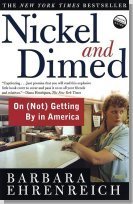Nickel and Dimed

The Fall 2005 book, Nickel and Dimed, by Barbara Ehrenreich, is a true story about trying to make a living on low wages and what the author learns from the experience. The book recounts the author's experiment of seeing if she could "match income to expenses" on low wages. Ehrenreich tells of her efforts to find work and the day-to-day activities of her work in three cities in three different states. Her goal was to spend a month working in each city to see if she could find a job and earn enough to pay a second month's rent. She learns a lot along the way about challenging work hours, such as split shifts; and job requirements, such as personality tests, drug tests, and uniforms. She describes how co-workers, supervisors, and customers treat her and her co-workers. Ehrenreich supplements her story with references to data on wages, poverty levels and housing from a variety of government sources. The story is engaging, as is the author's evaluation of her experience.
This book is rich with topics for reflection, analysis and discussion. Can a person with a doctorate degree and some wealth truly experience what it means to be poor? The author admits that, unlike her co-workers, she had health insurance, a home, and a bank account to fall back on. Was the author's approach--taking low wage, unskilled jobs for three months--the best way to tell the story of the working poor in the U.S.? What other approaches are possible? Several footnotes in the book provde data about poverty, but they are from 2001 and earlier. What is the current data and where can that data be found? What can be done to improve the working conditions of workers in low wage jobs? How can there be a better match of wages to the cost of housing, transportation, health care and food? What can be done to improve that match and who should be involved? What might the author's experience have been in Silicon Valley, where the cost-of-living is very high?
More Information
A short biography of the author from the NY Times.
A list of related publication appears below. Click on the links to learn more.
-
Down and Out in Paris and London, by George Orwell, 1933
-
The Betrayal of Work: How Low-Wage Jobs Fail 30 Million Americans and Their Families, by Beth Shulman, 2003
-
The Working Poor - Invisible in America, by David K. Shipler, 2004
-
The State of Working America 2004/2005, Economic Policy Institute
-
Bureau of Labor Statistics, A Profile of the Working Poor, 2000
-
USA Today, "What recovery? Working poor struggle to pay bills," June 2004
-
City Journal, "The Myth of the Working Poor," Autumn 2004
-
Public Policy Institute of California, Increasing the Minimum Wages: California's Winners and Losers, May 2000
-
History of the California minimum wage from the CA Industrial Welfare Commission
-
Federal 2005 Poverty Guidelines from the Dept. of Health and Human Services
Ways to Help People Who Are Having Financial Struggles
There are a variety of organizations, such as the YWCA and Career Closet, that help people who are having financial hardships. You may want to contact one of them to see what types of volunteer and donation opportunities are available. There are also opportunities to help through SJSU's Center for Service Learning.
How to Help SJSU Students - Often, SJSU students find themselves in a financial bind from the costs of college and living in Silicon Valley. SJSU maintains a fund that will make emergency loans to students where they can get the funds within 2 hours. This fund has become depleted over the past few years and is in need of contributions. If you can make a contribution, this would be one way to help members of our SJSU community. This fund is known both as the Stanley Benz Fund and the Deans' Emergency Loan Fund. Details of how it works and how you can make a tax-deductible contribution follow.
When an SJSU student needs money immediately to help buy food, obtain transportation, or meet other emergency needs, they can go to Counseling Services and be approved for a loan of up to $50 that they will receive within two hours from the Bursar's Office. This loan source is in need of enhancement.